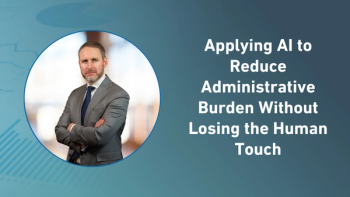
- Applied Clinical Trials-04-01-2018
- Volume 27
- Issue 4
Patient Input into Leveraging the Healthcare Professional’s Role
The second series of results from the Center for Information and Study on Clinical Research Participation’s (CISCRP) landmark 2017 Perceptions & Insights Study.
This article is the second in a series on the results from the Center for Information and Study on Clinical Research Participation’s (CISCRP) 2017 Perceptions & Insights Study. Nearly 12,500 people worldwide responded-including the public, patients, and study volunteers-and provided valuable insights into opportunities to improve global education, outreach, and engagement.
Conversation starters
While almost three quarters (71%) of people worldwide who have never participated in a clinical trial indicate they would be willing to do so, 90% indicate that they have never been asked by their doctor. Among individuals managing a disease, less than 25% have had their doctor or nurse suggest a trial as a treatment option.
In this article, we explore patient perceptions on the importance of the healthcare professional’s (HCP) role in providing support and reliable information in the search for a clinical trial, and highlight new opportunities for increased patient enrollment.
Currently, those without clinical trial experience indicate that they would most likely begin a search for a clinical trial by asking their own HCP (61%). It should be noted that respondents from Europe were somewhat less likely to do so (54%) when compared to other regions. An online clinical trial registry was also mentioned as a starting point, particularly among those who had previously participated in a clinical trial (50%) who were more likely to use the resource than those who had no prior clinical research experience (38%). A general online search was also frequently mentioned among those who had never participated (31%), with 18-to-34 year olds the most likely (46%) to begin looking for a clinical trial on a search engine such as Google or Yahoo.
The public reports referring to a variety of sources that could be unreliable or that may lack helpful information that would be useful to know when making a decision to participate. This could contribute to the lack of confidence the public reports feeling in their ability to identify clinical trials appropriate for them.
When asked how patients should best learn about clinical research, 64% of non-participants chose their HCP, and additionally felt it was important for their HCP to be aware of clinical trials in their communities (94%). Furthermore, the majority (88%) would find it valuable to learn about study options during a regular doctor visit, with older populations finding this the most valuable (see chart). Yet, 73% of respondents claimed that they never or seldom discussed a clinical trial as a treatment option with their HCP, with respondents from North America, Europe, and Asia-Pacific the most likely to have never discussed study options with their doctor. In contrast, South Americans considered clinical trials as a treatment option during doctor visits the most (59%), and were the most likely to report feeling “Very confident” about finding a clinical trial that is right for them (25%), illustrating the significance of a trusted physician’s involvement in identifying a clinical trial to participate in.
The “so what?”
Patients’ desire to turn to and consult their HCP about participating in clinical trials highlights opportunities for increased enrollment. According to a recent study by the Tufts Center for the Study of Drug Development, the majority of physicians in an online survey (91%) feel comfortable discussing clinical trials as a treatment option with patients, but lack access to trial information (54%), are unsure of where to refer patients (48%), or do not have enough time to learn about the trial (33%). To increase public confidence in finding an appropriate clinical trial and likelihood of HCPs recommending clinical trials as treatment options, pharmaceutical companies should more actively approach doctors well in advance of the enrollment phase. By providing HCPs with ample information about the clinical trial and sufficient time to review, pharma companies can leverage the trusting relationship between doctors and their patients and effectively connect more people to clinical trials right for them.
CISCRP Research Services: Nova Getz, Annick Anderson, Jasmine Benger.
Study methodology
The objectives of this study are to establish routine global assessments of public and patient perceptions, motivations, and experiences with clinical research participation to monitor trends and identify opportunities to better inform and engage the public and patients as stakeholders and partners in the clinical research enterprise.
Between May and July 2017, CISCRP conducted an online international survey. The survey instrument was based in part on questions posed in past surveys. CISCRP received input and support from pharmaceutical, biotechnology, and contract research organizations (CROs), and from investigative sites. A total of 12,427 respondents completed the survey. The online questionnaire was reviewed by an ethical review committee. CISCRP collaborated with Acurian, Clariness, CureClick, HealthUnlocked, and Quintiles to reach and engage respondents.
For more information about CISCRP’s 2017 Perceptions & Insights Study and to download reports, visit
Articles in this issue
almost 8 years ago
Barriers and Solutions to Smart Clinical Program Designsalmost 8 years ago
MythBusting: 6 eConsent Myths we Need to Correct in 2018almost 8 years ago
Eli Lilly Joins the Force on Clinical Trial Patient Educationalmost 8 years ago
The Pull and Tug on Orphan Drug Developmentalmost 8 years ago
The Commedia Dell'Arte of the EMA Relocationalmost 8 years ago
The Impetus for Natural History Studies in Rare Disease R&Dalmost 8 years ago
All in Our Heads? The Power of Placebo Responsealmost 8 years ago
Applied Clinical Trials, April 2018 Issue (PDF)Newsletter
Stay current in clinical research with Applied Clinical Trials, providing expert insights, regulatory updates, and practical strategies for successful clinical trial design and execution.




